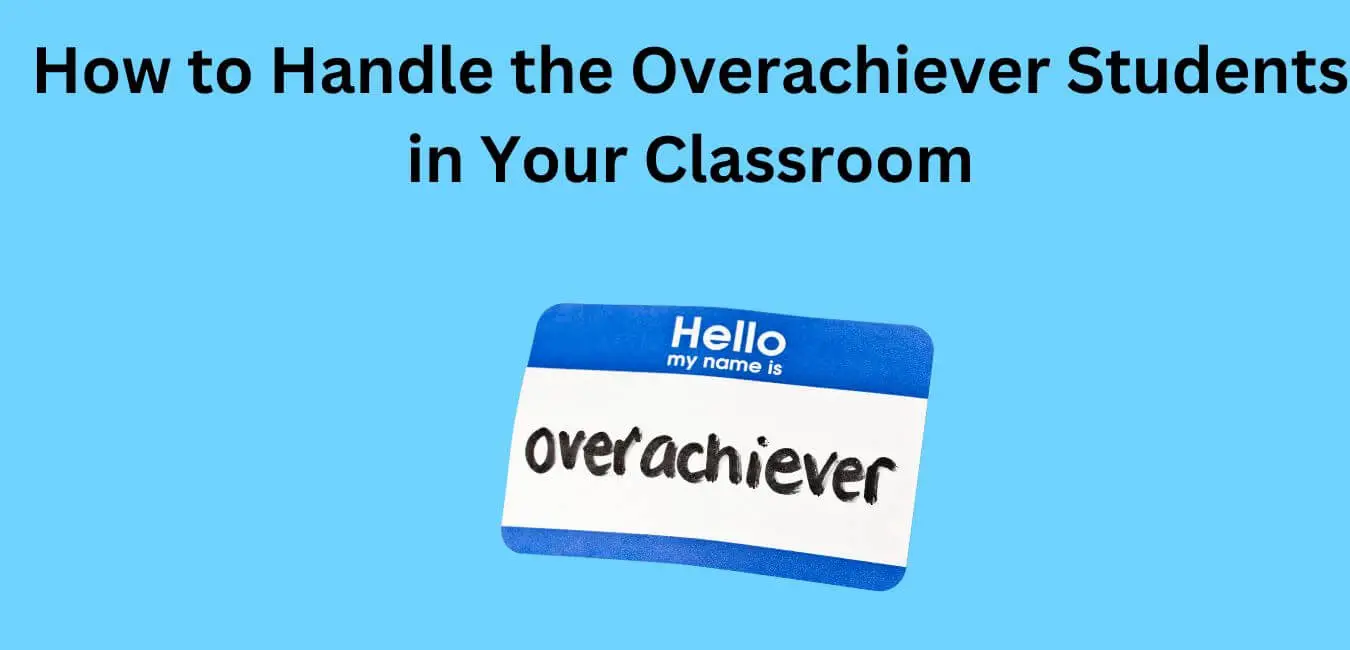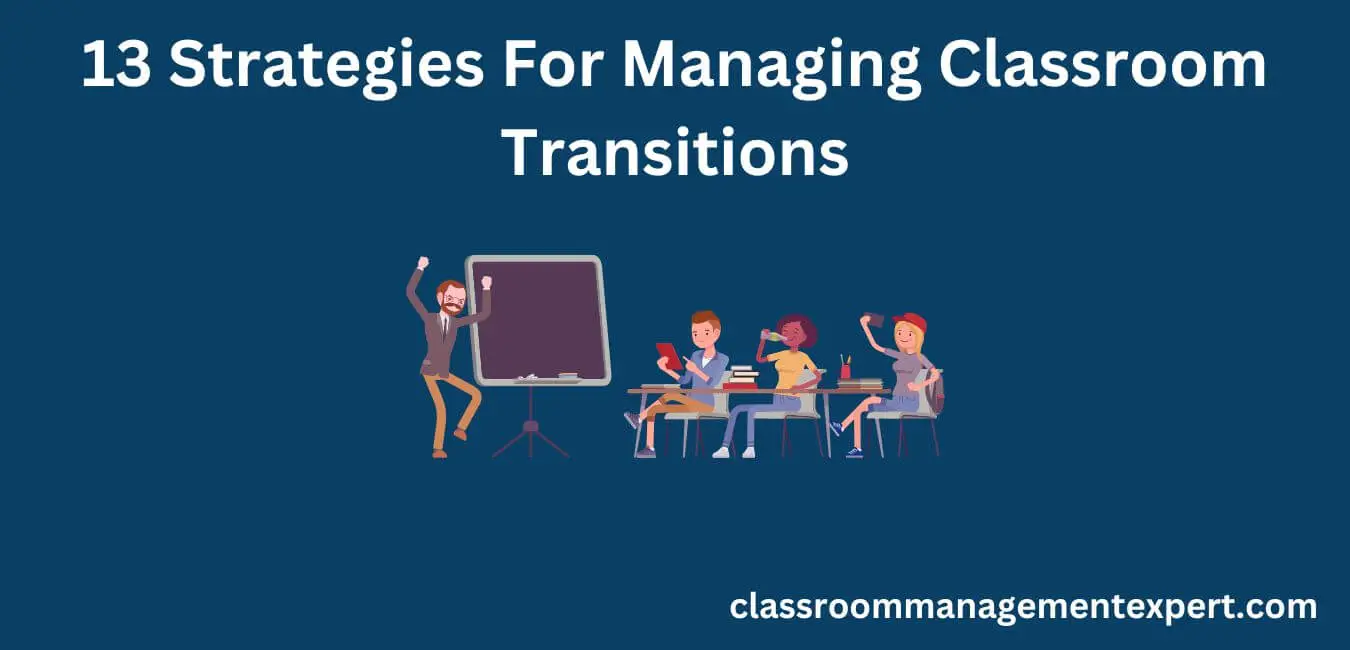Are you a teacher facing the challenge of dealing with overachievers in your classroom? You are not alone! Many teachers find it difficult to manage the unique needs of these high-achieving students. I had the same challenge.
Fortunately, there are strategies that can help make managing these students easier. In this article, we will explore 15 strategies to help you handle overachievers in your classroom.
From setting expectations to facilitating collaboration, these strategies provide practical solutions that can be implemented immediately.
With these strategies, you’ll be able to create an environment where all students can succeed and reach their full potential. So let’s get started!
Remember, there is no one-size-fits-all strategy for handling high-achieving students in the classroom. Experiment and find those strategies that work well for you and your students.
Reasons Why You Should Manage Your Overachiever Students with Care
I know the thoughts that run through your head when you look at your overachievers. You may feel a sense of pride but also a hint of fear because you understand the dangers of overachieving. That’s why it’s important to manage your overachievers with care. Here are seven reasons why:
1. They laugh—at themselves and with others. Overachievers may be driven, but they know how to enjoy life. Refusing to take themselves too seriously helps them stay healthy and balanced.
2. They are completion-oriented. This trait can be beneficial in many situations but can also become a source of stress if expectations are too high.
3. They may be taking on too much. As parents, many of us (including me) are guilty of promoting this culture. Make sure your students don’t take on more than they can handle.
4. They may have underlying fears. Overachievers may have an underlying fear of failure or a sense of self-worth contingent upon competence. Helping them deal with these issues is critical to their well-being.
5. They may experience more stress than other students. Although all students have stressors in their lives, overachievers tend to increase their stress levels by taking on too many tasks and activities.
6. They can fall into an anxiety-depression cycle. This can easily spur students into a state of anxiety or depression, which could then cause them to perform even worse in their classes.
7. They need encouragement and support.
Tips to Help You Handle the Overachiever Students in Your Classroom
The following are some of the strategies you can use to manage your overachievers:
1. Encourage Teamwork
Teaching a classroom full of overachieving students can present a unique challenge, but try to create an atmosphere of collaborative learning.
One of the best ways to foster teamwork is to create a classroom environment that allows students to work together on projects.
This can be done by assigning group tasks or by having them work together on individual assignments.
Encouraging communication and collaboration among students can help them develop confidence in their own abilities and build relationships with their peers.
Additionally, create an atmosphere of respect and understanding, and make sure everyone is able to contribute their ideas.
By creating these conditions, you can ensure that your students are working together in a productive and meaningful way. Find more ideas here on how to promote teamwork among your students.
2. Offer Individualized Attention
Being an overachiever can be a double-edged sword. On one hand, these students have the drive and ambition to succeed, while on the other hand, they can be overly conscientious and put too much pressure on themselves.
As a teacher, it is important to recognize the unique needs of these students and offer individualized attention to help them find balance and success.
The best way to offer individualized attention is to get to know each student. Spend time getting to know their interests, goals, and passions.
Making a personal connection with each student is a great way to build trust and communication. This will provide you with insight into what motivates them and what kind of support they need.
Creating individualized plans for each student is also an effective way to offer individualized attention.
This can involve setting realistic goals and expectations, providing choices in assignments, and encouraging creativity. It may also involve helping them develop strategies for managing stress and conflict.
Finally, it is important to provide feedback that is both constructive and encouraging. Praise the effort the student puts in and provide guidance on how they can improve their work. This will help them stay motivated and continue striving to do their best.
3. Involve Overachievers in Classroom Tasks
In the previous section, we discussed the importance of encouraging teamwork among students.
An effective way to incorporate overachievers into the classroom is to involve them in classroom tasks.
This will allow them to use their natural talents and skills while being part of the team. You can involve them in tasks such as leading group discussions, organizing group projects, or developing new ideas.
By having them take on these tasks, they will be able to have a sense of ownership in the classroom and feel more connected to the classroom activities.
This will also help them to develop better communication skills and learn how to work collaboratively with others.
It is important to remember to set realistic expectations for overachiever students, as it is easy for them to become overwhelmed with too many tasks.
Make sure to take into account their individual abilities and talents and assign tasks that are appropriate for their level.
4. Set Realistic Expectations
When dealing with overachiever students, it is important to set realistic expectations. The pressure to excel can be too much for some students, leading to stress and even burnout.
It is important to remember that not all students are able to reach the same levels of success and that individual differences should be respected.
It is important to focus on effort and progress rather than outcomes. It is also important to provide students with an understanding of what is expected of them, as well as strategies to help them reach these expectations.
By setting realistic expectations and providing students with the tools they need to reach their goals, you can help them avoid feeling overwhelmed and stressed.
5. Leave Room for Failure
When it comes to dealing with overachievers in your classroom, it’s important to understand the importance of allowing room for failure.
Allowing students to fail can help create an environment of resilience and growth. This can be achieved by providing a supportive and safe environment for students to take risks and make mistakes without fear of judgment.
Encourage your students to take risks, make mistakes, and use these experiences as learning opportunities.
You can also use failure as a teaching moment. Ask your students to reflect on their actions and how they could have done things differently to achieve a better outcome.
This will help them learn from their mistakes and develop problem-solving skills that can be applied in future situations.
Additionally, it’s important to provide support and understanding when students are struggling, as this will help them to develop the confidence and resilience needed to overcome challenges in the future.
6. Provide Opportunities for Self-Discovery
Self-discovery is an important part of the learning process, and it’s especially important for overachieving students.
By providing opportunities for self-exploration, you can help students understand their strengths and weaknesses, as well as how to better manage their own learning.
You can provide activities such as surveys, quizzes, and personal reflections to help students identify their individual goals and potential.
You can also offer topics for discussion that encourage students to think about how their experiences, skills, and abilities can help them reach their goals.
Finally, you can provide activities that challenge students to think critically and develop problem-solving skills.
By providing opportunities for self-discovery, you can empower your students to take ownership of their education and develop into successful and balanced learners.
7. Help Students Find Balance
Balancing the workload of overachieving students can be difficult. As a teacher, it’s important to keep in mind that they are individuals with unique needs and capabilities.
Helping them find balance is key to helping them reach their potential. Encourage them to take breaks and pursue other interests outside of the classroom.
Provide them with resources and guidance to help them set goals and prioritize tasks. Remind them that it’s ok to make mistakes and that perfection is not necessary in order to succeed.
Finally, show your appreciation for their hard work and dedication by recognizing their achievements. Doing so will help the overachievers in your classroom find balance and stay motivated.
8. Promote Healthy Competition
Promoting healthy competition amongst your students is a great way to help the overachievers in your classroom.
Allowing students to compete with each other in a safe and supported environment can help them challenge themselves, stay motivated, and strive for excellence.
It can also help foster positive relationships among the students as they support each other in their endeavors.
This can be achieved through activities such as quiz bowls, debates, or even competitions where students can earn rewards for their efforts.
Make sure to make the competition fair and equitable and provide equal opportunities for everyone. This will help create an environment where all students feel their best efforts are valued and appreciated.
9. Encourage Self-Reflection
Self-reflection is an important skill for students to develop in order to help them understand their strengths, limitations, and areas for improvement.
By encouraging students to take time to reflect on their work or experiences, you can help them become more aware of their own capabilities and set realistic goals for themselves.
You can also provide them with the tools and support they need to reflect effectively and make meaningful changes in their lives.
Consider creating activities that require students to assess their progress, identify areas of growth, and develop plans for improvement.
Additionally, encourage them to use journaling or other creative methods to express how they feel about their successes and failures.
With the right guidance, your students will be able to develop the skills they need to become more independent, self-aware learners.
10. Reward Effort over Outcome
It’s easy to get caught up in the need to achieve, but it’s important to remember that it’s the effort and hard work that should be rewarded.
Rewarding effort over the outcome is a great way to help overachieving students manage their stress and expectations.
By recognizing the effort and hard work put in by your students, you can help them stay motivated and keep striving for success.
It’s also a good way to help them build a sense of pride in their accomplishments, even if they don’t achieve the desired outcome.
This can help them stay focused and motivated, even when faced with challenges and setbacks.
Additionally, rewarding effort over outcome helps create a positive learning environment where students are encouraged to take risks and think outside the box.
11. Offer Multiple Paths to Success
In order to help overachievers reach their full potential, it’s important to offer them multiple paths to success. This allows them to explore their own talents and interests while still making progress.
Providing a variety of options also increases their chances of finding a path that works best for them.
This can be done by offering different activities, assignments, and projects within the same subject. For example, if you are teaching a math class, provide a range of mathematical concepts and problems for students to choose from, such as equations, geometry, algebra, and more.
By offering multiple paths to success, overachievers will be able to explore their own capabilities and talents and find the best way for them to reach their goals.
12. Provide Choice in Assignments
Giving students choices in assignments is a great way to make them feel empowered and in control of their learning.
Allow students to choose the assignments that are most interesting or relevant to them. It can help make the learning process more enjoyable while also giving overachievers the opportunity to go above and beyond the expected requirements.
Providing choice also allows students to develop a deeper understanding of the material. When assignments are tailored to the student’s individual interests, it can help them become more engaged and invested in the learning process.
It also gives them the chance to explore topics in greater detail and practice the skills that are most relevant to them.
In addition to providing choices in assignments, it is important to give students the freedom to make mistakes.
This is especially true for overachievers, who may be used to achieving perfection and may be fearful of failing.
Encouraging risk-taking and allowing for mistakes can be a great way to help students learn and grow.
13. Encourage Creativity
Creativity is an important skill for overachiever students to possess and develop. As educators, it is our responsibility to help foster their creativity and encourage them to express their ideas in unique ways.
To do this, it is important to provide opportunities for students to think outside of the box and come up with their own solutions to problems.
For example, you can give your overachievers the chance to come up with their own project ideas or design their own experiments.
You can also encourage them to engage in activities that allow them to be creative, such as art or music.
By giving students the chance to be creative and express themselves, you’ll be helping them to develop important skills that will benefit them both in and out of the classroom.
14. Help Students Stay Engaged
In order to help overachiever students stay engaged in the classroom, it is important to provide them with a variety of activities that will keep them stimulated.
Incorporating different types of teaching styles and learning activities can help keep everyone in the class engaged, including overachievers.
For example, you could have students take part in group activities such as debates or role-playing games.
You could also set up projects where students have the opportunity to express their creativity. Additionally, activities that require collaboration between students can help foster teamwork and promote positive peer interactions.
Ultimately, by providing engaging activities, you can ensure that overachiever students stay focused and motivated in the classroom. You may like to check out our guide on how to keep your students engaged in the classroom here.
15. Encourage Positive Peer Interactions
Having positive peer interaction in the classroom is essential for overachieving students to be successful.
It is important to create an environment where students are able to communicate and collaborate with each other in a positive way.
The teacher needs to foster a safe and supportive classroom atmosphere where students feel comfortable taking risks, asking questions, and expressing their ideas.
This can be accomplished by providing opportunities for students to work together and engage in meaningful conversations.
Additionally, teachers should promote respect and kindness among students, and ensure that all students are treated fairly and kindly.
By fostering a positive classroom culture, students are more likely to strive to do their best and achieve their goals.
Conclusion
To conclude, these 15 strategies to help you handle overachiever students in your classroom can help you ensure that all of your students get the support and attention they need. By implementing these strategies, you can create a learning environment that is supportive and encourages collaboration among all students. Additionally, it will also give you more time to focus on individual student needs and allow for differentiated instruction. Ultimately, it is important to remember to be patient, flexible, and understanding when dealing with overachievers. With the right approach, these students have the potential to become great contributors in your classroom and beyond.



















